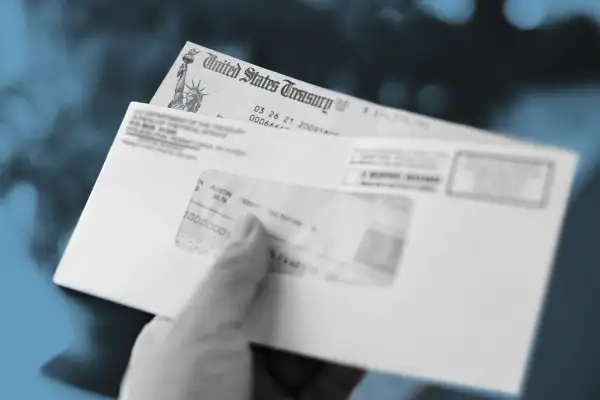The IRS Has Sent out Its Last Stimulus Checks — but You Still Might Be Eligible for More Money

The IRS says it has completed sending out stimulus checks — but you may qualify to get more money, depending on your 2021 taxes.
As part of the American Rescue Plan, the IRS issued more than 175 million Economic Impact Payments to help people cope with the effects of the pandemic. The legislation gave the IRS a Dec. 31, 2021, deadline to distribute those payments, which amounted to the third (and likely final) stimulus check for COVID-19.
Last week, the IRS announced that it has officially wrapped up the process. Some checks "may still be in the mail," but in general "the IRS is no longer issuing payments as required by law," it said in a news release.
If you never got your third stimulus check or think you may be due more money, don't worry. The third-round Economic Impact Payment was an advance payment of the 2021 Recovery Rebate Credit, so you can recoup missing funds by claiming the credit on your tax return. This is especially important because the IRS used tax information from your 2020 return or earlier to calculate stimulus payments, and more money may be available if your circumstances have changed since then.
Ultimately, the amount of your Recovery Rebate Credit is based on your income and the number of eligible dependents on your 2021 taxes. If your income has dipped from the amount on your 2020 tax return and/or if you added a new dependent to your family in 2021, you may be able to claim additional stimulus money when you file your taxes this season.
Here’s when the Recovery Rebate Credit may apply:
- Your income has dipped: If you’re a single filer who earned more than $80,000 (or $160,000 for joint filers) in 2020 but less than that amount in 2021, you may be eligible for a $1,400 credit. Similarly, if you earned between $75,000 and $80,000 in 2020 (or between $150,000 and $160,000 jointly) but made less than that on your 2021 return, you could receive partial credit similar to “plus-up payments” — just in the form of a tax credit.
- You have a new child or dependent: The IRS says that if you had a baby in 2021 and claim your child as a dependent on your 2021 tax return, you’ll be eligible for a credit of up to $1,400. Likewise, if you’ve added another dependent — which could be a grandchild, parent or other qualifying relative — you may be able to claim up to a $1,400 credit per person.
The credit will either reduce your tax bill or go toward your refund, the IRS says, and it will not be issued as a separate check.
Additionally, the IRS is encouraging new parents (birth, adoption or foster care) to claim the child tax credit on their 2021 tax returns to receive a credit up to $3,600 per child.
This year, tax season officially started Jan. 24 and runs until April 18 in most states, due to a long holiday weekend. In most cases, it’s generally advised to file as soon as possible to get a speedy refund. However, if you suspect you’re still owed stimulus money, make sure you have the correct information about any previous stimulus payments you’ve received before filing.
The IRS is sending out the information you need in the mail in a document called Letter 6475. If you haven’t received the letter or you’ve accidentally thrown it out, you can view your stimulus payment details on your online account through the IRS under the “Tax Records” section.
Incomplete or incorrect returns will only delay the process. Fortunately, there are two key things the IRS says you can do to speed things up.
“The fastest and most secure way for eligible individuals to get their 2021 tax refund that will include their allowable 2021 Recovery Rebate Credit,” the IRS says, "is by filing electronically and choosing direct deposit.”
More from Money:
5 Best Tax Relief Companies of 2022
Can You File Taxes for Free With TurboTax? It's Especially Complicated This Year
